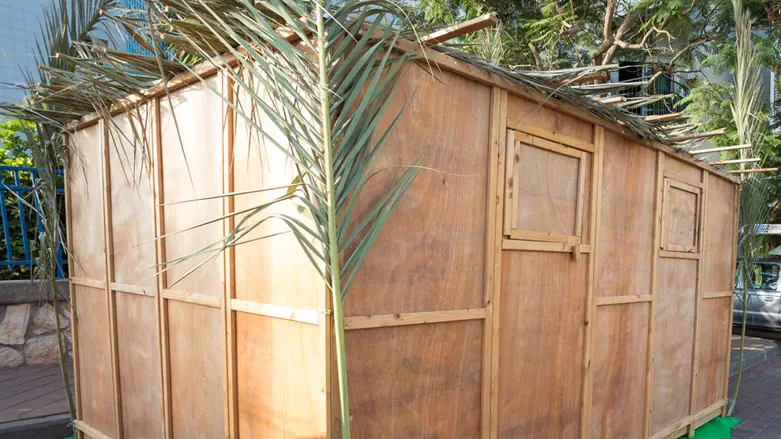
An aged man is but a paltry thing,
A tattered coat upon a stick, unless
Soul clap its hands and sing, and louder sing
For every tatter in its mortal dress.-W.B. Yeats, Sailing to Byzantium
There’s something ironic about Sukkot. Just as the weather starts to turn unpredictable and cold, we’re asked to leave our warm homes and spend a week in what amounts to a glorified wooden box with a leaky roof. Yet this flimsy hut, the sukkah, is at the center of a holiday that commands us to feel pure joy. It seems like a paradox—a space so vulnerable, so exposed to the elements, and yet, we’re told this is where true joy resides. Why would the festival most associated with happiness ask us to dwell in such a fragile, temporary space?
It’s not that I don’t see the beauty in it. There’s something undeniably poetic about building the sukkah, about stepping outside our homes and embracing the temporary nature of life. But let’s be real—it can be uncomfortable. And for those of us with little kids, getting everyone into the sukkah for a meal feels like herding cats into a cardboard box, just slightly more chaotic.
So why, then, do we call this holiday “zman simchateinu,” the time of our joy? Because to be honest, joy isn't always the first thing that comes to mind when I’m sitting in the sukkah, shivering (or sweating depending on the time of year) and swatting away the occasional bee.
But what is joy, anyway? Does it come from safety and security? From fun and good times? We often assume that joy is found in the effortless, carefree moments—when everything falls into place just the way we want. We imagine joy as something that grows out of comfort, where life is predictable and easy, free from struggle or uncertainty. It’s tempting to think that if we could just eliminate the hard parts, we’d finally be happy. But is that really where joy lives?
In Man’s Search for Meaning, Viktor Frankl reflects on how meaning—and joy—is found not in comfort but in challenge: “What man actually needs is not a tensionless state but rather the striving and struggling for some goal worthy of him.” Joy, in Frankl’s view, is not the absence of struggle but the feeling that our struggles are meaningful, that they bring us closer to something greater than ourselves.

Sukkot is precisely about that striving. Leaving our homes and subjecting ourselves to discomfort, becomes a metaphor for stepping into a life of spiritual purpose. We are reminded that joy isn’t the result of avoiding difficulty, but of confronting it—of stepping into the weight of responsibility and the vulnerability of the sukkah with open arms.
This idea reminds me of The Unbearable Lightness of Being by Milan Kundera and the way the book addresses the tension between weight and lightness. Kundera says:
The heavier the burden, the closer our lives come to the earth, the more real and truthful they become. Conversely, the absolute absence of burden causes man to be lighter than air, to soar into heights, take leave of the earth and his earthly being, and become only half real, his movements as free as they are insignificant. What then shall we choose? Weight or lightness?
Kundera’s “lightness” represents the temptation to avoid burden, to drift through life without taking on the challenge of responsibility. It’s the illusion of freedom—being “lighter than air,” unconstrained by obligation or duty. And yet, as Kundera points out, this freedom is not real. It leads to a lightness, yes, but an empty lightness, where life loses its grounding and its meaning.
Sitting in the sukkah feels like choosing weight. It reminds us of the richness found in challenging ourselves to do the things that don’t necessarily come easy to us, in choosing to “burdened” by commandedness, in looking beyond the immediacy of our own comfort.
In an age where self-care, personal happiness, and setting boundaries dominate our conversations, the sukkah serves as a powerful reminder to step outside ourselves. Rather than focusing solely on our individual comfort and joy, it calls us to embrace responsibility and confront challenges head-on.
The Torah isn’t shy about asking us to step out of our comfort zones—literally. And maybe that’s because joy isn’t about feeling secure or settled. It’s about realizing that the things we think give us security are actually not as solid as we believe. It’s about embracing the weight of duty, of obligation, and yes, sometimes, the weight of the rain-soaked branches we call a roof.
On Sukkot, joy is emphasized because we are forced to face this tension: comfort versus discomfort, security versus fragility, lightness versus weight. And it’s in choosing weight that we discover a joy that truly feels substantial.
Arty Cweiber is the coordinator of I Read This Over Shabbos , a project about cultivating a community where lovers of ideas, words, and books can turn Shabbos into their weekly book club. She is a freelance writer and social media manager who specializes in creating substantive, SEO-friendly content. When Arty isn’t running after her two (adorable) children, she can usually be found with a book in hand.